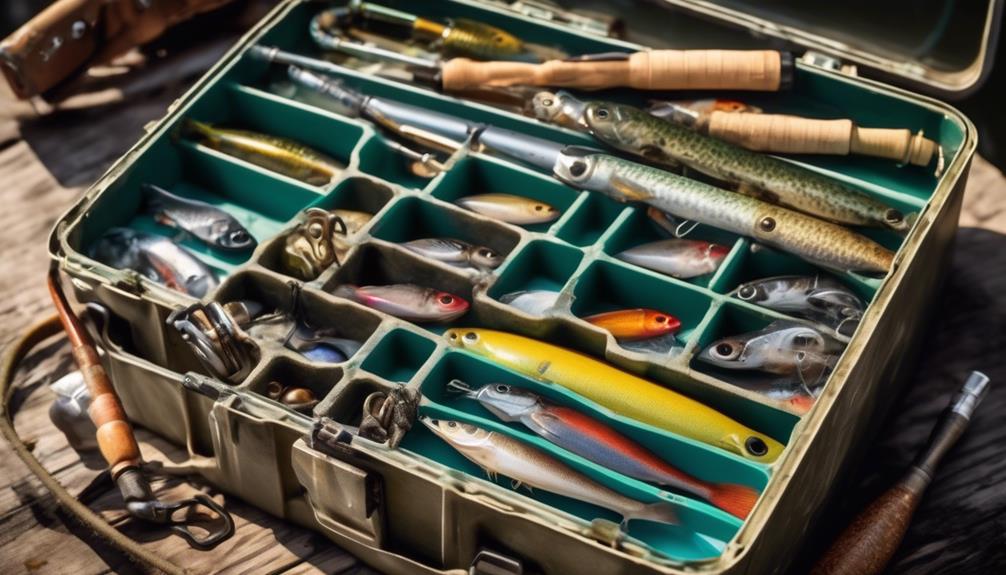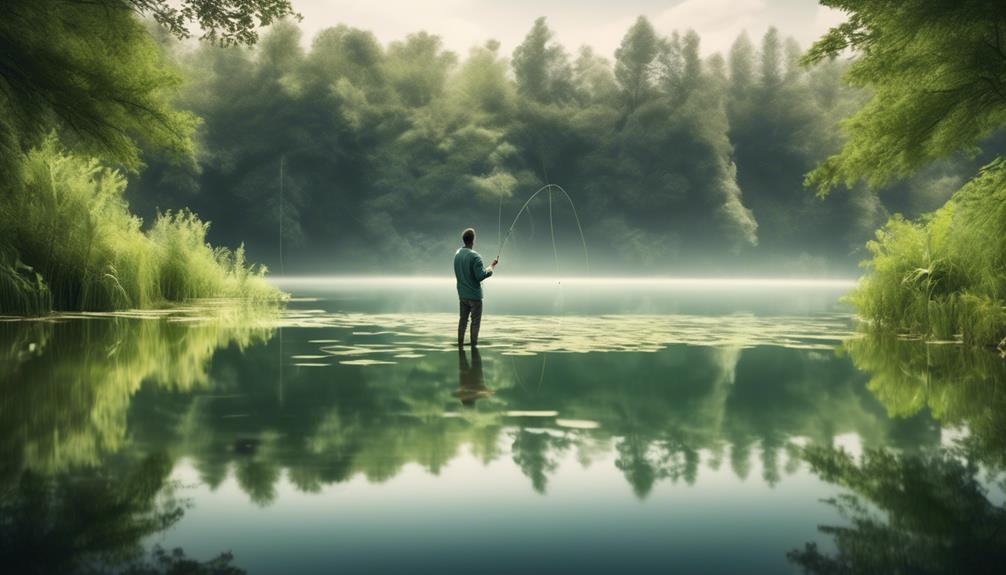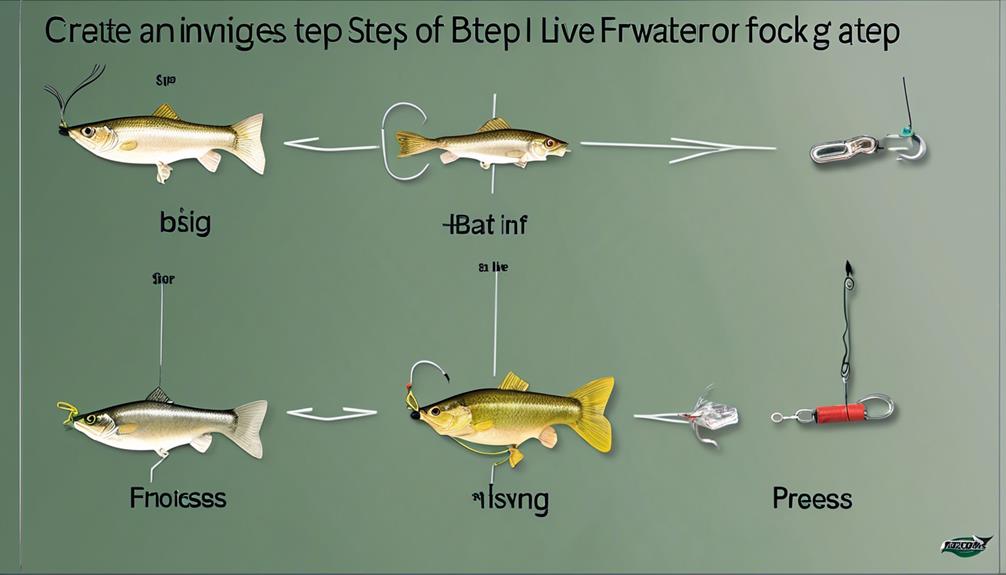They say that variety is the spice of life, and nowhere is that more evident than in the world of fishing.
As an angler, you're always seeking new challenges and opportunities to reel in the big one. Whether you're a seasoned freshwater fisherman or a saltwater enthusiast, the differences between the two can significantly impact your experience on the water.
From the type of fish you target to the equipment you use, understanding these distinctions can make or break your next fishing trip.
So, let's break down the 14 key differences between freshwater and saltwater fishing and explore how each one can shape your angling adventures.
Location and Environment
When choosing between freshwater and saltwater fishing, consider the distinct locations and environments of each, as they greatly impact the fishing experience. In freshwater fishing, you'll find a diverse range of species due to the high biodiversity of freshwater ecosystems. Rivers, lakes, and ponds support various fish species, providing an opportunity to target a wide array of fish such as bass, trout, catfish, and more. This biodiversity enhances the excitement of freshwater fishing as you never know what you might reel in. However, the ecological impact of overfishing and habitat destruction can significantly affect these delicate freshwater environments.
On the other hand, saltwater fishing takes place in coastal areas and oceans, where the climate and water conditions differ vastly from freshwater bodies. The marine environment sustains its own unique ecosystem, with species like tuna, marlin, snapper, and many others. The warm, saline water of the ocean presents a completely different set of challenges and fishing opportunities compared to freshwater. Additionally, saltwater fishing can have ecological impacts such as overfishing, habitat degradation, and harm to non-targeted species. Understanding and respecting the ecological balance of these environments is crucial for preserving the biodiversity that makes both freshwater and saltwater fishing so appealing.
Ultimately, the choice between freshwater and saltwater fishing involves considering not only the target catch but also the environmental impact and conservation efforts necessary to maintain healthy, thriving ecosystems.
Fish Species Diversity
To fully appreciate the diversity of fish species, you must explore the distinct ecosystems of both freshwater and saltwater environments.
In freshwater fishing, the variety of fish species is often influenced by the type of water body. Lakes and rivers are home to species such as trout, bass, and catfish, each with their own bait preference and habitat preference.
For instance, trout are often attracted to artificial flies and prefer clear, cold water with high oxygen levels, while catfish are known to be bottom-feeders, responding well to bait like chicken liver or stink bait in muddy waters.
In contrast, saltwater fishing offers a vast array of species, including snapper, tuna, and marlin. These species vary greatly in catch size and catch rate, providing both a thrilling challenge and a rewarding catch.
For example, catching a marlin can be a formidable feat due to its size and strength, while snapper may provide a higher catch rate, making it a popular choice among anglers. Additionally, saltwater species often exhibit habitat preference, with some preferring coastal areas while others are found in deep offshore waters.
Understanding the diverse fish species in both environments adds an exciting element to fishing, as it allows you to tailor your approach based on the behavior and characteristics of each species.
Equipment and Tackle
Selecting the appropriate equipment and tackle is crucial for a successful fishing experience, as it directly impacts your ability to effectively catch different fish species in freshwater or saltwater environments. When it comes to freshwater fishing, your choice of rod and reel is typically lighter and more versatile. In contrast, for saltwater fishing, you'll need sturdier and heavier equipment to handle the larger and stronger fish commonly found in the ocean.
Here are some key differences in equipment and tackle between freshwater and saltwater fishing:
- Rod and Reel
- *Freshwater*: Lighter and more flexible rods and reels are suitable for smaller fish species like trout and bass.
- *Saltwater*: Sturdier and heavier rods and reels are essential for targeting larger, stronger fish such as tuna and marlin.
- Bait and Lures
- *Freshwater*: Artificial lures, such as spinners and plastic worms, are popular choices for enticing freshwater fish in rivers and lakes.
- *Saltwater*: Natural baits like live baitfish, squid, and shrimp, as well as larger artificial lures, are often used to attract the attention of saltwater game fish.
- Tackle
- *Freshwater*: Lighter lines and smaller hooks are commonly used for freshwater fishing to accommodate the size and behavior of the target fish.
- *Saltwater*: Thicker lines, heavy-duty swivels, and stronger hooks are necessary to handle the power and aggression of saltwater species like sharks and tarpon.
Understanding these equipment and tackle differences is crucial for optimizing your fishing experience in either freshwater or saltwater environments.
Techniques and Strategies
With the right techniques and strategies, you can effectively apply your chosen equipment and tackle to maximize your success in freshwater or saltwater fishing environments. When it comes to bait selection, freshwater and saltwater fishing differ significantly.
In freshwater fishing, live bait such as worms, minnows, and insects are commonly used to attract fish. On the other hand, saltwater fishing often involves the use of cut bait, shrimp, or squid due to the different species found in these environments. Understanding the preferences of the fish species you're targeting is crucial for successful bait selection in both settings.
Casting techniques also vary between freshwater and saltwater fishing. In freshwater fishing, precision casting is often required in areas with vegetation and obstacles. On the other hand, saltwater fishing may involve longer casts due to the vastness of open water. Additionally, the use of heavier lures and rigs in saltwater fishing demands a different casting approach compared to the lighter tackle often used in freshwater environments.
Furthermore, the choice between boat fishing and shore fishing is another important consideration. In freshwater fishing, shore fishing is common and allows for easy access to many productive areas. In contrast, saltwater fishing often benefits from boat fishing, as it provides access to deeper waters and a wider range of species.
Understanding these differences in techniques and strategies will greatly enhance your fishing experience, whether you're in freshwater or saltwater environments.
Accessibility and Costs
When considering the accessibility and costs of freshwater and saltwater fishing, it's important to assess the proximity of fishing locations and the associated expenses to make an informed decision for your fishing activities. Both freshwater and saltwater fishing offer unique advantages and considerations when it comes to resource availability, economic impact, and overall accessibility.
- Resource Availability
- Freshwater Fishing: In many regions, freshwater fishing spots are abundant and easily accessible, providing a wide variety of fish species for anglers to target. Lakes, rivers, and ponds are often well-stocked with fish, offering ample opportunities for a successful fishing trip.
- Saltwater Fishing: Saltwater fishing locations may require more travel and effort to reach, but they offer access to a diverse range of marine species. Coastal areas and deep-sea fishing grounds provide opportunities to catch larger game fish, such as tuna and marlin, making saltwater fishing an appealing choice for those seeking a more challenging angling experience.
- Economic Impact
- Freshwater Fishing: Due to the accessibility of freshwater fishing locations, anglers may find that their overall expenses are lower. Less travel and transportation costs can make freshwater fishing a more cost-effective option for many individuals.
- Saltwater Fishing: Accessing saltwater fishing spots, especially those located offshore, may involve higher costs for boat charters, fuel, and specialized equipment. As a result, saltwater fishing can have a greater economic impact on anglers, requiring a more substantial investment in gear and trip expenses.
Considering these factors will help you determine which type of fishing best aligns with your preferences, budget, and overall fishing goals.
Regulations and Restrictions
Navigating the regulations and restrictions for both freshwater and saltwater fishing is essential for ensuring compliance with local laws and preserving the natural environment. When it comes to catch limits, freshwater fishing often has more strict regulations compared to saltwater fishing. This is due to the vulnerability of freshwater fish populations and the need for conservation measures. Many freshwater bodies have specific catch limits for certain species to prevent overfishing and ensure sustainability.
In contrast, saltwater fishing regulations may be more focused on the size of the catch rather than strict limits, allowing for more flexibility in the types and quantities of fish that can be caught.
Conservation measures also vary between freshwater and saltwater fishing. In freshwater fishing, there are often designated seasons for certain species to protect them during sensitive times such as spawning. Additionally, specific areas may be off-limits to fishing in order to protect critical habitats.
Saltwater fishing conservation measures may include restrictions on certain gear types to minimize bycatch and protect non-target species. Furthermore, marine protected areas are established to safeguard entire ecosystems and the diverse species within them.
Understanding and adhering to these regulations and restrictions is crucial for sustainable fishing practices. It not only helps in preserving fish populations for future generations but also contributes to the overall health of aquatic ecosystems. Whether you prefer freshwater or saltwater fishing, respecting these regulations is key to ensuring the long-term viability of this recreational activity.
Maintenance and Care

To ensure the longevity of your fishing equipment, regular maintenance and care are essential. Proper gear storage is crucial to prevent damage and corrosion, especially when transitioning between freshwater and saltwater fishing. Here are some tips to help you maintain your equipment:
- Gear Storage
- Rinse all fishing gear, including rods, reels, and lures, with fresh water after each saltwater fishing trip to remove salt and debris that can cause corrosion.
- Store your freshwater and saltwater fishing gear separately to prevent cross-contamination and potential damage from saltwater residue.
- Consider using protective cases or bags to store and transport your fishing equipment, providing an extra layer of defense against wear and tear.
In addition to gear maintenance, proper boat maintenance is essential for those who enjoy saltwater fishing:
- Boat Maintenance
- After saltwater fishing trips, thoroughly rinse your boat with fresh water, including the hull, deck, and engine, to remove salt deposits that can lead to corrosion.
- Regularly inspect and maintain your boat's engine, electrical systems, and trailer to ensure they're in good working condition, as saltwater can accelerate wear and tear on these components.
- Consider applying a protective wax or coating to the boat's exterior to provide an additional barrier against saltwater damage.
Community and Culture
Proper gear maintenance and care go beyond preserving your equipment – they're integral to the shared traditions and values within the fishing community. Whether you're freshwater or saltwater fishing, the culture surrounding this pastime is rich with history and tradition. Fishing traditions are passed down through generations, creating a sense of continuity and belonging within the community. These traditions often revolve around the sharing of knowledge, techniques, and experiences, reinforcing the strong bond among fellow anglers.
Social gatherings play a significant role in the fishing community, providing opportunities for anglers to come together and celebrate their shared passion. Whether it's a local fishing tournament, a gathering at the fishing pier, or simply swapping stories at the tackle shop, these social events foster a sense of camaraderie and belonging among anglers. They offer a platform for exchanging tips, discussing favorite fishing spots, and reliving memorable catches, further enriching the fishing culture.
Participating in these social gatherings and upholding fishing traditions not only strengthens the sense of community but also instills a deep respect for the environment and the resources it provides. The fishing community values sustainability and conservation, understanding the importance of preserving marine and freshwater ecosystems for future generations of anglers. By embracing these traditions and actively engaging in the fishing community, you become part of a larger narrative, contributing to the preservation of cherished customs and values.
Frequently Asked Questions
What Are the Main Challenges of Fishing in Both Freshwater and Saltwater Environments?
Fishing in both freshwater and saltwater environments presents unique challenges. Equipment differences and techniques vary greatly between the two. In freshwater, you may encounter obstacles such as snags, while in saltwater, you'll contend with stronger currents and larger fish.
How Does the Taste of Freshwater Fish Compare to Saltwater Fish?
Freshwater fish taste tends to be milder, while saltwater fish taste is often more robust. Grilled or pan-seared is best for freshwater fish, while saltwater fish is great for grilling or frying.
Are There Any Specific Safety Precautions That Should Be Taken When Fishing in Either Freshwater or Saltwater?
When fishing, always consider safety precautions. Use appropriate gear and be mindful of environmental impact. Support conservation efforts by following regulations. In freshwater, watch for strong currents; in saltwater, beware of tides and waves.
How Does the Conservation of Fish Populations Differ Between Freshwater and Saltwater Fishing?
When fishing in freshwater, conservation practices involve managing fish populations through stocking programs and size limits. In saltwater, population management focuses on regulating commercial fishing and establishing marine protected areas to protect fish populations.
What Are the Unique Environmental Impacts of Freshwater and Saltwater Fishing?
When fishing in freshwater or saltwater, it's crucial to consider the environmental impacts. Sustainable practices are key to maintaining ecosystem health. Fishing regulations help in preserving fish populations and preventing overfishing, ensuring a balanced and thriving environment.
Conclusion
In conclusion, whether you prefer freshwater or saltwater fishing, each has its own unique appeal and challenges. From the diverse fish species to the equipment and techniques used, there are many key differences to consider.
Whether you enjoy the tranquility of freshwater lakes or the thrill of deep sea fishing, both offer rewarding experiences for anglers of all levels. So, grab your gear and get out there to explore the world of fishing!



